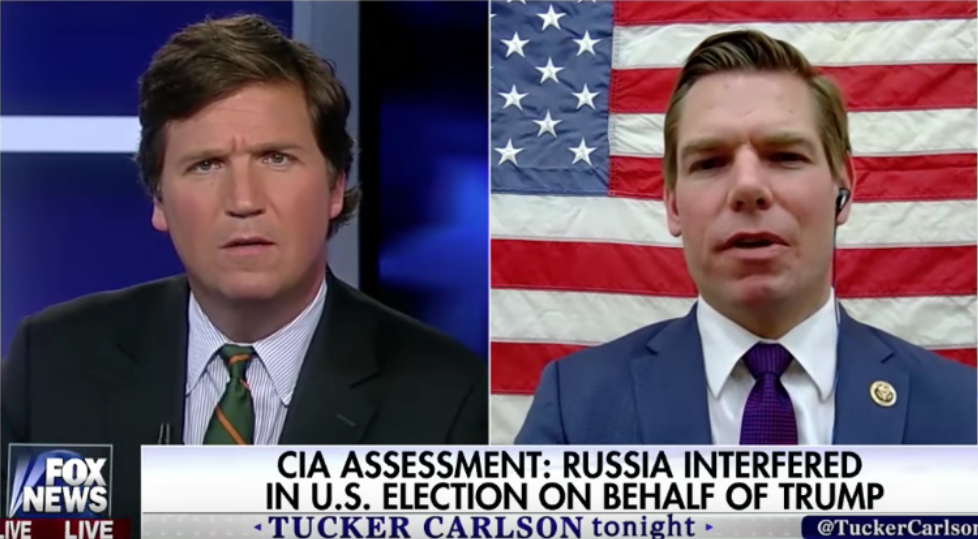Andrew Anglin
Daily Stormer
December 15, 2016
https://www.youtube.com/watch?v=RigD4gY_e6U
Tucker Carlson takes down California Democratic Representative Eric Swalwell!
Eric Swalwell has been spreading fringe conspiracy theories promoted by controversial “fake news” websites such as The New York Times. He was been traveling in a circlejerk circle of true believers in such tinfoil hat conspiracy hoaxes for many days.
He was not ready for the Tuck.
This time, Tucker did bring up the fact that there is no evidence that the gmail account of Podesta was hacked by anything other than a phishing email – a fact which I find more important than the fact that there is no evidence that the leaks themselves influenced voters’ decisions.
In fact, we found the email that shows that Podesta responded to a phishing scam within the Wikileaks dump itself.
As CNN reported way back on October 31st:
A phishing email sent to Hillary Clinton campaign chairman John Podesta may have been so sophisticated that it fooled the campaign’s own IT staffers, who at one point advised him it was a legitimate warning to change his password.
The stolen email thread, released by WikiLeaks Friday, also provides the most direct evidence yet that the Russian government was behind the damaging hack into the Clinton campaign, according to a private cybersecurity company.
The thread shows a Clinton campaign staffer writing that a phishing email sent to Podesta’s Gmail account on March 19, 2016, is “legitimate,” though the staffer advises him to go through Google’s official procedures to update his password. It’s not clear if Podesta gave hackers his password before he was advised by his staff, or if the email in question was the one that led to the hack.
…
On its face, the source of the potentially dangerous email is Google, but a closer look at the actual mailing address shows an unfamiliar or bogus-looking account: “no-reply@accounts.googlemail.com.”
The subject line warns, “Someone has your password” and the body of the message says “someone” in Ukraine tried, but was stopped, from signing into Podesta’s account.
“You should change your password immediately,” the email warns. The words “CHANGE PASSWORD” then appear — inviting Podesta to click on them — as a way to do just that. But the address did not link to a secure Google web page, instead directing the user blindly via bit.ly, a service used to shorten or conceal web addresses.
According to the cybersercurity company SecureWorks, the link used in the Podesta email was clicked two times. If his information was entered into a form on the landing site — potentially run by a hacker — the floodgates could have opened right there.
So he was told to change his password after he responded to a phishing email and didn’t do it.
Anyone can send a phishing email. You don’t have to be the Russian government. Literally any person with a laptop can do it. And the email allegedly came from the Ukraine, which is just a general base of internet crime – and is not an ally of Russia, as maybe you’ve heard.
Also of interest is the fact that in early October, /pol/ was able to hack Podesta’s new email account, as well as his twitter.
John Podesta’s Twitter account appears to be compromised pic.twitter.com/8QpBu4V4fZ
— Abby D. Phillip (@abbydphillip) October 12, 2016
So, he was not a person with very good security, it seems.
The other big “hack” – the DNC – in fact appears to have been a leak.
Several people, including a former UK diplomat, claim to have met the leaker.
IBT:
The assessment of the Central Intelligence Agency (CIA) that hackers aligned with the Russian state handed over thousands of stolen emails from the Democratic National Committee (DNC) to WikiLeaks is “utter bulls**t”, according to a former UK ambassador.
Craig Murray, who was the British ambassador to Uzbekistan between 2002 and 2004, now a close confidante of WikiLeaks’ founder Julian Assange, said in a blog post on 11 December that the CIA’s assertion was “a blatant lie” that had little evidence to support it.
On 9 December, a CIA assessment said the agency had “high confidence” covert Russian forces interfered with the 2016 presidential election with the ultimate aim of seeing Donald Trump in the White House, reported the New York Times and Washington Post, citing anonymous sources.
According to the Post, intelligence experts had “identified individuals with connections to the Russian government” who reportedly provided WikiLeaks with nearly 20,000 emails from the DNC and tens of thousands from the personal inbox of Hillary Clinton’s campaign chairman, John Podesta.
The intelligence sources, who remain unnamed, said the individuals were known to US agencies and that it was a “consensus view” that adversaries were conducting a sophisticated campaign to seed doubt in the election process while ultimately boosting Trump’s chances of election.
“A little simple logic demolishes the CIA’s claims,” Murray countered. “The CIA claim they ‘know the individuals’ involved. Yet under Obama the USA has been absolutely ruthless in its persecution of whistleblowers and its pursuit of foreign hackers through extradition.
“We are supposed to believe that […] even though the CIA knows who the individuals are, nobody is going to be arrested or extradited, or, if in Russia, made subject to yet more banking and other restrictions against Russian individuals? Plainly, it stinks.”
Murray, in an interview with The Guardian, claimed he knows the source of the DNC leaks – but like in his blog post (falling victim to the same argument he makes about US intelligence) provides no hard evidence – apart from his word – to show why his assertions should be believed.
“I know who leaked them,” Murray said. “I’ve met the person who leaked them, and they are certainly not Russian and it’s an insider.” Arguing the entire case should be based on “access” and “truthfulness” Murray noted only a small number of people had “access to the source of the leak.”
He wrote: “The continued ability of the mainstream media to claim the leaks lost Clinton the election because of ‘Russia’, while still never acknowledging the truths the leaks reveal, is Kafkaesque.” Murray decried media reporting on Russian links as buying “utter bulls**t from the executive.”
The CIA and the fake news websites are asking us to believe them over our own eyes and basic common sense. Given their track records, I don’t see any reason we should believe anything the CIA or the fake news says.


